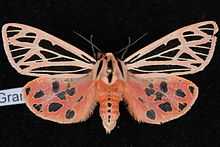Grammia doris
From Wikipedia, the free encyclopedia
| Grammia doris | |
|---|---|
 | |
| Scientific classification | |
| Kingdom: | Animalia |
| Phylum: | Arthropoda |
| Class: | Insecta |
| Order: | Lepidoptera |
| Family: | Arctiidae |
| Genus: | Grammia |
| Species: | G. doris |
| Binomial name | |
| Grammia doris (Boisduval, 1869) | |
| Synonyms | |
| |
Grammia doris, the Doris Tiger Moth, is a moth of the Arctiidae family. It was described by Boisduval in 1869. It is found in British Columbia, northern Idaho, Alberta and western Montana. In the east, it is found in the Atlantic Coast provinces and from Nova Scotia to northern Florida and west to central Texas. The habitat consists of open willow/sedge fens and probably other open wetlands in the boreal forest.
The length of the forewings is about 19 mm. The forewings are light pinkish white with black markings. The hindwings are deep pink with pale rimmed black spots. Adults are on wing from June to August.[1]
The larvae feed on various herbaceous plants, including Lactuca sativa and Taraxacum officinale.[2]
Subspecies
- Grammia doris doris
- Grammia doris minea (Slosson, 1892)
References
This article is issued from Wikipedia. The text is available under the Creative Commons Attribution/Share Alike; additional terms may apply for the media files.